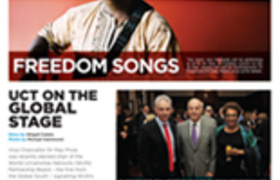Mind Matter
18 August 2014
It's the most complex organ in your body, capable of simultaneously processing thousands upon thousands of inputs at a time on the equivalent of 20 watts of electricity - a third of that required by your average lightbulb. What do we know about the human brain? The Centre for Open Learning recently hosted four public lectures focusing on key features of this incredible organ - starting with what newborns can teach us about neuroscience, and ending with the ageing of the brain (and what we can do to slow it down) - with studies on drug addiction and the difference between male and female brains presented in between.
-
Sex and the brain
There are basic physical differences between women's and men's brains, starting in the womb and continuing into later life, says UCT's Professor of Neuropsychology Mark Solms. The question is to what extent these differences are prewired, and what role socialisation plays. Read more. -
Newborns teach us Neuroscience
What's happening in a baby's brain just after birth? Dr Nils Bergman talks us through the first 1 000 minutes of a child's life - and why bonding between mother and child is critical for the development of happy, healthy, social beings. Read more. -
Your brain on drugs
In what is considered one of the most memorable anti-narcotics advertisements in history, commissioned by the Partnership for a Drug-Free America, an egg is shown frying in a pan with a voiceover proclaiming, "This is your brain on drugs. Any questions?" Yet there are many complex questions that still need answering when it comes to the neuroscience of drug addiction. Read more. -
How your brain ages
Ageing is inevitable, but what can we do to keep our brains young and limber as long as possible? According to neurologist Etienne van der Walt, what's good for your heart is good for your head too. Here's why. Read more.
Extend Yourself
This Monday Monthly feature on the brain comes from a four-part lecture series on neuroscience, hosted by UCT's Centre for Open Learning, in partnership with ComaCare (a research institute based in the neurosurgery section of Groote Schuur, specialising in care for coma patients) and Brainstorm the City. One of Cape Town's official World Design Capital 2014 projects, Brainstorm the City is a campaign to raise awareness around the extraordinary complexity of the human brain, and is organised by Dr Ross Balchin, a postdoctoral fellow in the Department of Psychology, and Janice Webster, director of ComaCare.
The lectures also formed part of the Centre for Open Learning's Summer School Extended programme – which makes the knowledge and resources of the university open to the public throughout the year. Evening lectures on offer later this year include the start of a series commemorating World War I, and two sessions focused on astronomy, as well as a full astronomy course that includes outings to the observatories in Observatory and Sutherland. If you want to hear more about how we're all made of stardust, or hear John Maytham read excerpts from WWI literature, join the Summer School mailing list by emailing ems@uct.ac.za, calling 021 650 2888, or following UCT Summer School online:
@UCTSummerSchool
www.summerschool.uct.ac.za
 This work is licensed under a Creative Commons Attribution-NoDerivatives 4.0 International License.
This work is licensed under a Creative Commons Attribution-NoDerivatives 4.0 International License.
Please view the republishing articles page for more information.
Feature
Faculty Focus - Science
News
Front page
Previous Editions










